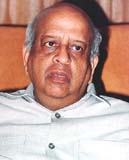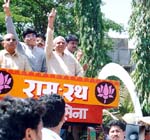It is something of a mystery what Seshan's minions do with this vast accumulation of detritus
 Take, for instance, the simple matter of motor vehicles. Should
Seshan, curling his lip, snarl, 'Yeah, what about cars?'
your average candidate would be well advised to desist from producing
his parole certificate and instead whip out the Model Code of
Conduct. It contains not a word about cars! Now, is or is not
the Code of Conduct the Ten Commandments ( and a bit more!) of
Shri Moses Seshan? Indeed, let the candidate go a step further.
Your Average Candidate might not have got beyond fifth class
before he was rusticated but, based on his previous encounters
with the law, he must have found himself a good lawyer.
Take, for instance, the simple matter of motor vehicles. Should
Seshan, curling his lip, snarl, 'Yeah, what about cars?'
your average candidate would be well advised to desist from producing
his parole certificate and instead whip out the Model Code of
Conduct. It contains not a word about cars! Now, is or is not
the Code of Conduct the Ten Commandments ( and a bit more!) of
Shri Moses Seshan? Indeed, let the candidate go a step further.
Your Average Candidate might not have got beyond fifth class
before he was rusticated but, based on his previous encounters
with the law, he must have found himself a good lawyer.
If that lawyer were to go through all 500 pages of Nirvachan Sadan's compendium,
he might find a great deal about official cars and ministers contesting
elections -- but not a word about non-ministerial candidates and
their cars. Nor about two-wheeler scooters, motorcycles, auto-rickshaws,
power-driven bicycles, you name it.
Yet, it is these vehicles that are the stuff and substance of
getting the electoral message across. What, with respect to vehicles,
it permitted and what is not is not listed anywhere, merely thrown
out at press conferences. Worse, thrown out at press conferences
not by the articulate Messiah alone but by a whole army of mini-Messiahs
spread across the length and breadth of our benighted land.
In my case, the collector of Thanjavur was reported in the papers
as saying that a candidate would be permitted only seven vehicles.
Consternation followed by clarification; clarification by consternation.
It took all three weeks of the campaign to discover that the collector
was referring only to the polling day itself.
Even then, no one
-- least of all the collector -- could tell what was the legal
sanction for the administrative order, whether it was the maha-Messiah
of Nirvachan Sadan or the chhota-Messiah of the state election
commission who was behind it, and what, above all, was meant by 'car'.
Would, for instance, my wife driving off to Swamimalai
to pray for the mandate the people were withholding constitute
'corrupt practice' if hers was the eighth car on the
roads; and what proportion of petrol, oil and lubricants, not
to mention wear-and-tear, should be attributed to my election
account -- the whole journey or only that portion which fell within
my constituency till she crossed over to the next in which Swamimalai
lay?
In any case, the Election Commission wants vouchers, hundreds
even thousands of vouchers, not just for petrol but staplers and
rubber bands, photocopies and fax messages -- anything to swell
the vaults of Nirvachan Sadan. It is something of a mystery as
to what Seshan's minions do with this vast accumulation of detritus.
For the law permits the Election Commission only to gather the
garbage; the Election Commission is prevented by law from auditing
the accounts.
The mounds of paper are dusted off and examined
only if there is an electoral dispute. And although the law says
every electoral dispute must be settled within six months and
a by-election ordered immediately should the previously elected
candidate be found guilty, only the most wizened chaprasi in
Nirvachan Sadan is able to recall when the courts and the Election
Commission actually disposed of a disputed election within the
mandatory period.
The problem on the ground is that the overwhelming majority of
party workers -- in every party, not just mine --- are not your
typical nine-to-five types. Most are unemployed -- many unemployable.
If they did not hold down a regular job, they would not be available
for round-the-clock campaigning. I do not know how urban candidates
manage; in rural constituencies like the one I used to represent,
educated party workers are available only because agriculture
is not a whole-year occupation. The result is that virtually no
party worker is trained in the 'payments-against-vouchers'
culture that comes so naturally to the babus of Nirvachan Sadan.
 However much one begs the party worker to produce vouchers and
fill in log-books, nine times out of ten he returns with the payment
made but no voucher to show for it. That would not matter if Seshan
were to allow me to confess to an expenditure without proving that
it was actually incurred. Instead, how, asks Seshan, do I know
you actually did not spend more? True. So, in the absence of vouchers,
I am left with no alternative but to say it was not spent at all!
However much one begs the party worker to produce vouchers and
fill in log-books, nine times out of ten he returns with the payment
made but no voucher to show for it. That would not matter if Seshan
were to allow me to confess to an expenditure without proving that
it was actually incurred. Instead, how, asks Seshan, do I know
you actually did not spend more? True. So, in the absence of vouchers,
I am left with no alternative but to say it was not spent at all!
What really stumped me on the vouchers front was the very first
expenditure item desired of me: the cost of my nomination form.
Now, this presumably is standard throughout the country. Must
each candidate fill the column individually? In any case, what
am I to do when my agent tells me he got the nomination form for
free? How can you have, I plead. But it was given to me free,
he replies. I contact the returning officer. Yup, he confirms we
did not charge for it. But the standard return says I must account
for what I spent on the form.
If it was nil, why would Nirvachan
Sadan want to know? A gleam enters my agent's eye. Put down any
figure you like, quoth he, and I will rustle up a receipt to match
the confession!
|





 Take, for instance, the simple matter of motor vehicles. Should
Seshan, curling his lip, snarl, 'Yeah, what about cars?'
your average candidate would be well advised to desist from producing
his parole certificate and instead whip out the Model Code of
Conduct. It contains not a word about cars! Now, is or is not
the Code of Conduct the Ten Commandments ( and a bit more!) of
Shri Moses Seshan? Indeed, let the candidate go a step further.
Your Average Candidate might not have got beyond fifth class
before he was rusticated but, based on his previous encounters
with the law, he must have found himself a good lawyer.
Take, for instance, the simple matter of motor vehicles. Should
Seshan, curling his lip, snarl, 'Yeah, what about cars?'
your average candidate would be well advised to desist from producing
his parole certificate and instead whip out the Model Code of
Conduct. It contains not a word about cars! Now, is or is not
the Code of Conduct the Ten Commandments ( and a bit more!) of
Shri Moses Seshan? Indeed, let the candidate go a step further.
Your Average Candidate might not have got beyond fifth class
before he was rusticated but, based on his previous encounters
with the law, he must have found himself a good lawyer.
 However much one begs the party worker to produce vouchers and
fill in log-books, nine times out of ten he returns with the payment
made but no voucher to show for it. That would not matter if Seshan
were to allow me to confess to an expenditure without proving that
it was actually incurred. Instead, how, asks Seshan, do I know
you actually did not spend more? True. So, in the absence of vouchers,
I am left with no alternative but to say it was not spent at all!
However much one begs the party worker to produce vouchers and
fill in log-books, nine times out of ten he returns with the payment
made but no voucher to show for it. That would not matter if Seshan
were to allow me to confess to an expenditure without proving that
it was actually incurred. Instead, how, asks Seshan, do I know
you actually did not spend more? True. So, in the absence of vouchers,
I am left with no alternative but to say it was not spent at all!